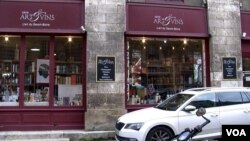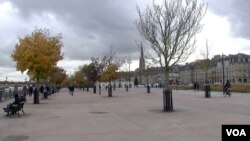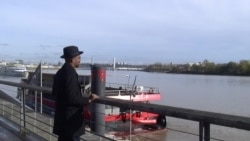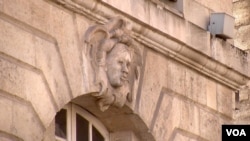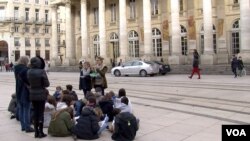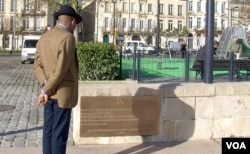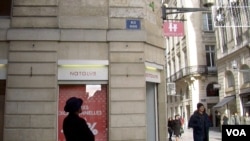Ships ply the wide sweep of the Garonne River, bringing tourists and wine connoisseurs to this iconic city whose skyline glitters in the morning sun. But Karfa Diallo, gazing out at the water, remembers a much grimmer commercial past.
For more than 150 years, Bordeaux was France's second-largest slave-trading hub after the city of Nantes, dispatching ships that transported some 130,000 slaves from Africa to the Americas. They returned laden with coffee, cacao, spices and tobacco, helping to enrich the city coffers.
Today, as head of the small association Memoires et Partages (Memories and Sharing), Diallo is on a mission to spread awareness about the darker legacy of Bordeaux, which he believes it has yet to fully confront.
"The image of wine is very hard to reconcile with the image of slavery," said Senegalese-born Diallo, from his small office packed with books and posters. "That's why the city was very late in giving history the place it merited in public spaces and schools."
The association conducts two-hour walking tours "to make this history accessible to everyone," Diallo says. It has also lobbied municipal authorities for years to erect explanatory plaques and memorials — and, for a time, even to change street signs named after famous slave traders.
In some ways, official France came to terms with the horrors of slavery in 2001 with a law recognizing the scourge as a crime against humanity. Five years later, former president Jacques Chirac proclaimed a national day of remembrance for its victims, saying that facing up to the country's colonial past was "key to national cohesion."
But with the far-right gaining ground, and mounting fears of rising racism and xenophobia across Europe, Diallo believes his work has gained added relevance.
"You can't call it a crisis in Europe because it's been going on for years with the difficult economic conditions," he said. "And Europe, this old continent, has a tendency to fall back on native Europeans before the others. Which makes immigrants the easy target for all problems."
Diallo is an immigrant himself, arriving here as a law student two decades ago from his native Dakar, whose Goree Island, just off the coast, marked the exit point for legions of African slaves bound for the Americas.
His studies took a U-turn when he began probing Bordeaux's own departure point.
"I realized this town enriched itself on the blood and sweat of my ancestors and did nothing to remember this," he said.
On a recent morning, Diallo gives a visitor an abbreviated version of his slave tour. At the Place de la Bourse, he points to the elegant customs museum where traders once paid duties for their colonial merchandise. And to the African heads carved into a nearby building.
Across from the opera, he ducks into a crowded restaurant to show a copy of a fresco — the original is inside the opera — with a slave linked to a monkey.
The next stop is the river, where Diallo pauses next to a small plaque, easily lost amid the wide esplanade filled with bikers and joggers. It bears witness to the first slave-trading ship that left the city's port at the end of the 17th century — and to the hundreds that followed until 1837.
Bordeaux's city hall inaugurated the plaque more than a decade ago, striking down lobbies for a larger memorial as too costly. But, across the river, it has added a bust of Toussaint L'Ouverture, the 18th-century leader of the world's largest slave revolt in Haiti. The local museum now has several rooms dedicated to the city's slave-trading past. And recently, municipal authorities launched a citizen questionnaire about what more can be done.
"But we need to do it intelligently, without accusations," said Deputy Mayor Marik Fetouh. "We can't be responsible for what our ancestors did. Every class, all the Bordelais economy, participated in the slave trade, as did Africans and Arabs."
Diablo agrees the city's past must be taught without bitterness.
"Our discourse isn't about shaming people, but is measured and thought out," he said of his tours. "Especially trying to tell the story of slavery around the world, not just the West, but also the Arabic-Muslim world and in Africa."
There also appears to be growing consensus between Diallo and city hall for explanatory plaques on streets named after slave traders, rather than discarding the names altogether.
As he walks down Bordeaux streets, Diallo stops often to greet friends and clients.
"I have become profoundly Bordelais, because in some ways I grew up here," he said. "I became a father here. This city gave me a sense of my life, even though it was not at all planned."




